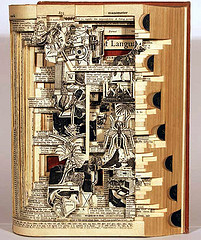 Yesterday, March 27, was this year’s “Day of DH.” D what? DH, stands for digital humanities. (More on what that actually means below.) And “Day of DH” is a day of, well, documentation and display—a showcase of global projects in the digital humanities, posted by their creators.
Yesterday, March 27, was this year’s “Day of DH.” D what? DH, stands for digital humanities. (More on what that actually means below.) And “Day of DH” is a day of, well, documentation and display—a showcase of global projects in the digital humanities, posted by their creators.
So just what is this “digital humanities” I speak of? The University of Alberta, which sponsors the event, has created a wiki page devoted precisely to this question. You can go broad with your definition: digital humanities = good ole humanities but with digital tools, especially when those tools facilitate participation beyond specialist audiences. Or you can go micro, naming all the different forms these practices might take:
- Creating digital editions, archives, websites, maps, visualizations and exhibits that allow for new explorations of humanities subjects, often across traditional disciplinary formations.
- Involving students in the research and creation of such editions, archives, websites, visualizations and exhibits, so that students gain hands-on experience with the production of knowledge.
- Studying the history and culture of media, often in alignment with the history of the book, the history of technology, film studies and material culture studies.
- Studying social media, digital culture, human-computer interactions and cultural informatics.
- Creating algorithms for studying humanities questions at large scale, or employing such “scaled up” analytic methodologies.
- Reconsidering and reinventing traditional practices and ideas of scholarly communication: publication, peer review, intellectual property; as well as traditional definitions and locations of scholarship: professor, library, book, journal, faculty, humanities.
You can look at the stream of posts from the event’s many participants here–or follow specific contributors here.

Thanks Isabelle–and thanks for the link to Digital Humanities Now!
Thanks for this post and its great links, Gabrielle. I would like to add a website I follow on Twitter that helps keeping updated on all things DH: it is found at http://digitalhumanitiesnow.org/